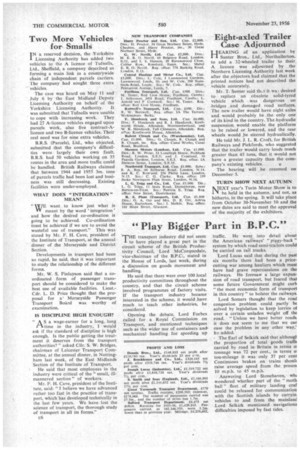"Play Bigger Part
Page 46

If you've noticed an error in this article please click here to report it so we can fix it.
in 'B.P.C."
THE transport industry did not seem
to have played a great part in the circuit scheme of the British Productivity Council, Lord McCorquodale, vice-chairman of the B.P.C:, stated in the House of Lords, last week, during a discussion on goods movement and handling.
He said that there were over 100 local productivity committees throughout the country, and that the circuit scheme involved programmes of factory visits. If the transport industry became interested in the scheme, it would have much to teach other industries, he considered.
Opening the debate, Lord Forbes called for a Royal Commission on Transport, and mentioned techniques such as the wider use of containers and traffic. He went into detail about the American railways' "piggy-back " system by which road semi-trailers could be carried on rail trucks.
Lord Lucas said that during the past six months there had been a pricecutting war among hauliers which must have had grave repercussions on the railways. He foresaw a large expansion of road transport, but feared that some future Government might curb "the most economic form of transport in this country" to bolster the railways.
Lord Somers thought that the road congestion problem could partly be solved by legislation to keep lorries of over a certain unladen weight off the road. "Unless we have better roads, it does not seem to me that we can ease the problem in any other way,'' ha added.
The Earl of Selkirk said that althougt the proportion of total goods traffic carried by road in Britain in terms ol tonnage was 72 per cent., in terms 01 ton-mileage it was only 37 per cent Continuous brakes on trains shoulc raise average speed from the presen 10 m.p.h. to 45 m.p.h.
Answering Lord Stonehaven, whc wondered whether part of the "moth ball" fleet of military landing craf could be released for communication with the Scottish islands by carryin; vehicles to and from the mainland Lord Selkirk mentioned navigationa difficulties imposed by fast tides.
















































































































